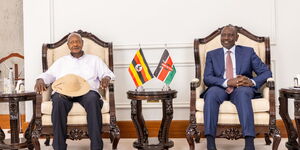The newly sworn-in Somali government has appointed the former Al Shabaab deputy leader, Mukhtar Robow, as Minister for Endowment and Religious Affairs.
He was selected to join the Cabinet by Somalia’s new Prime Minister, Hamza Abdi Barre.
Robow is a co-founder of the Al-Shabaab. He left the group in 2013 after conflict emerged with the group’s former leader, the late Ahmed Abdi Godane.
In August of 2017, the new Minister for Endowment and Religious Affairs surrendered to Somali authorities and was briefly put into custody.
Robow, a year later, attempted to run for the President of Somalia’s South West state but he was apprehended by Somalia’s federal government.
The United States government once put a Ksh500 million bounty on Robow who was identified by his alias, Abu Mansur.
America is one of Kenya's long-term allies in the fight against terror with both countries deploying soldiers to peacekeeping missions in Somalia to combat the Al Shabaab militants.
The appointment, which comes amid renewed relations between Kenya and Somalia, could easily shake diplomatic ties between the two countries due to Nairobi's tough stance on terrorism.
Al-Shabaab has been accused of conducting a series of coordinated attacks in East Africa, such as the 2010 World Cup bombing in Kampala, Uganda, that killed 74 people, and the 2013 assault on the Westgate Shopping Mall in Nairobi, Kenya, that left at least 67 dead.
Other attacks on Kenya include the 2019 DusitD2 hotel siege and the 2015 Garissa University attack that left a combined total of 168 victims dead.
Foreign relations experts further argue that it may dent Somalia's renewed interest in joining the East African Community (EAC).
Meanwhile, a 38-year-old woman was sentenced to three years in prison for allegedly sending Ksh35,700 to Al Shabaab in Kenya and Somalia.
Farhia Hassan, a Somali native, was charged in 2014 but fought extradition charges for seven years. She lost the case and was brought before a US District Court in Alexandria for trial.
According to the prosecutors, Hassan was among 15 women who communicated in an online chatroom to contribute funds in support of Al Shabaab activities in Kenya and Somalia.
Prosecutors argued that the money she contributed could be used to buy weapons as well as pay monthly wages for an Al Shabaab extremist.
"Every indication before the court is that she believes just as firmly in Al Shabaab’s mission as she did in 2011 when the conspiracy began,” prosecutor Danya Atiyeh noted.
Despite the prosecutors demanding the court to sentence Hassan to 8 years, she was only given 3 years. The other two leaders of the group had already been convicted and sentenced to 12 and 11 years in prison respectively.












